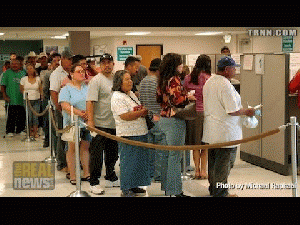Cross-posted from Huffington Post
While sincere efforts to help the poor should be encouraged, we should also realize that our current economic policies are doing much to harm the poor. First and foremost we should realize that the decision to maintain high rates of unemployment is having a devastating impact on the well-being of millions of low- and moderate-income workers and their children.
The reasons are straightforward. When the overall unemployment rate goes up, the rate for the less-educated and minorities rises even more. This has been a regular pattern in the data for many decades that has been very visible in the current downturn.
Before the recession the overall unemployment rate was at 4.5 percent. It peaked at 10.0 percent in the fall of 2009 before gradually falling back to its current 6.3 percent. By contrast, the unemployment rate for workers without high school degrees rose from just over 7.0 percent in the months before the recession to a peak of more than 15.0 percent in peak months in 2009 and 2010. This is an increase of 8.0 percentage points. The unemployment rate for blacks rose from just over 8.0 percent before the recession to a peak of more than 16.0 percent, also a rise of 8.0 percentage points.
High unemployment doesn't just hurt those at the bottom by denying them jobs, they also work fewer hours than they would like. The analysis in my book with Jared Bernstein, Getting Back to Full Employment, found that hours worked for families in the bottom fifth of the income distribution increased by 17 percent in the boom at the end of the 1990s. By contrast, hours worked barely increased at all for those in the top fifth.
And a lower unemployment rate means higher wages for those at the bottom. We found that a sustained one percentage point decline in the unemployment rate is associated with a 9.4 percent rise in real wages. To summarize, for the poor, lower unemployment translates into more jobs, more hours, and higher pay.
While the data on these points may be clear, many people will question that having high unemployment is a policy choice. That requires a little bit of thought.
At this point we have solid evidence that we can reduce the unemployment rate with increased government spending or tax cuts targeted to those who would spend the money. We have opted not to do so in order to reduce the deficit.
Some people may consider lower deficits to be a greater priority than increasing growth and reducing the unemployment rate, but that doesn't change the fact that this was a choice. Congress and President Obama (more the former than the latter) pushed policies to quickly reduce the deficit. This choice denied millions of low- and moderate-income people the opportunity to work and tens of millions more the opportunity to work more hours or to get higher wages.
In the same vein our trade policy has also been a major factor depressing the income of those at the bottom. Our trade deficit exploded in 1997 following the East Asian financial crisis. The policies imposed on the crisis countries led to a sharp run-up in the value of the dollar.
A higher priced dollar made our products much less competitive in the world economy. As a result we are now running a trade deficit of more than $500 billion a year. This is demand that is generated in the United States but is creating jobs in Mexico, China, and other countries. The trade deficit translates into a loss of more than 6 million jobs.
The point here should be clear. We can hugely boost employment and create enormous opportunities for low- and moderate-income families by having budget policies and trade policies that promoted high employment instead of policies that lead to high unemployment.
The government is actively working to deny low- and moderate-income families jobs and opportunities in a really big way. The people in Washington involved in the decision-making process that leads to this outcome may not think about the impact of these policies in this way, but who cares?
The damage they do to the poor with their ignorant policies swamps by several orders of magnitude any good they may hope to do with their small bore anti-poverty agendas. And for which they think the poor should be grateful.






